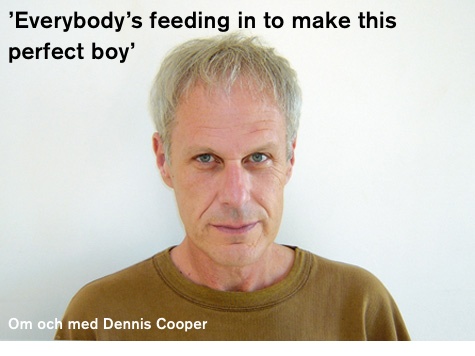*
En i flera avseenden osäkrad text. Inga moraliska ställningstaganden och inte heller någon tydlighet kring på vilken nivå av verklighet saker och ting utspelar sig. Frisk störs av brev som rubbar gränserna för vad som faktiskt sker i berättelsen och vad som är extremt våldsamma fantasier inuti samma berättelse. I Guide, den fjärde boken i cykeln, är strukturen mer fragmentarisk, och de utskrivna fantasierna snuddar vid “verkliga” händelser genom knark, psykos och form:
Mason spaced out, daydreaming. In his fantasy, Goofs slutty asshole belonged to Smear’s bassist. And that finger was Mason’s. Luke, Scott: klvxmhspwwlqhx… “God,” I say. “This is … so… intense.” I’m looking at something in Luke’s staring eyes that you wouldn’t understand. Mason glanced over at us. All’s well, he thought. Still… “You guys okay?” Nothing. So he reburrowed his eyes into Smear’s bassist’s “body.” (Guide)
*
JOHN, DAVID, GEORGE, CLIFF, ALEX, GEORGE, PHILIPPE, STEVE. Bögarna och deras namn. I Closer är varje kapitel döpt efter en karaktär. Förmodligen är det detta som får mig att fästa mig vid namnen också i de följande böckerna WARREN, DENNIS, NATE/ETAN, LEON/NOEL. Det är något intimt med hur namnen lyfts fram. Namnen gör dessa pojkar både till personer och till objekt. Det går att viska mot dessa projektionsytor, ta dem i handen. I hemlighet skriva deras namn om och om igen längst bak i kollegieblocket. Jag har förälskat mig i flera stycken av dem. Kanske velat ta hand om dem. George, med skönheten och ensamheten i Closer. Ziggy, med ängslan och desperationen i Try. När jag läser Cooper får jag lära mig att också omsorg är en våldsam projektion. Dessa hjärtskärande små objekt och smutsen kring hjärtskärandet. Äcklig förkrossande välvilja.
*
Försök att läsa Dennis Cooper: 1. Ett första möte med Dennis Coopers texter kan vara en fantastisk befrielse. Utöver att man totalt kan slukas av språkets hårda rättframhet, hur formen, romankonstruktionen, ter sig levande, i sig själv agerande, är det näst intill outhärdligt våldsamma i Coopers böcker paradoxalt nog ett slags lättnad. Att möta en böglitteratur som inte förhåller sig till politisk korrekthet, struntar i komma ut-processen, struntar i att förhålla sig till heterosexualitet över huvudtaget kan vara helt avgörande för en bögs politiska tänkande. Att ta sig bortom heteronormativitet kräver att man tar sig bortom moral. Att göra den läsningen visar hur färgad man är av att läsa den icke-heterosexuella erfarenhet heteronormativt. Helvete.
2. That was the weirdest part, feeling how warm and familiar George was and at the same time realizing the kid was just wrapped around some grotesque looking stuff. (Closer)
Lockande och frånstötande; Coopers berättelser och karaktärer rör sig mellan pornografi och djup tragedi. I jämförelse med mainstreamporrens mekaniska dominanslekar, top/bottom-positioner, handlar det sexuella våldet i Coopers böcker om ett rasande, ständigt otillfredsställt begär, ett som styckar sönder a) kroppen och b) fantasins gränser.
3. John, 18, hated his face. If his nose were smaller, his eyes a different brown, his bottom lip pouty… As a kid he’d been punched in the mouth and looked great for a couple of weeks. Six years ago punk rock had focused his life. John liked the way punk romanticized death, and its fashions made pretty good camouflage. (Closer)
Det ser ut som hastig nedklottrade anteckningar, rastlöst komprimerade. Ett slags protokollprosa som förmedlar skilda uppgifter i samma tonfall.
John / 18 / hated / liked / smaller / different / punched / romanticized
Ett tonfall som nonchigt rycker på axlarna och tittar bort. Som pojkarna i de här texterna tänker jag, lystet, eller kanske sorgset tänker jag det. Coopers pojkar beskrivs genom våldsamt uppspärrade ögon, genomträngande blickar som gör dem olidligt vackra, samtidigt som de själva tittar bort. Men inte av arrogans. De går liksom inte att få kontakt med. De går omkring avdomnade, väck, stenade, uppfuckade, inte tillräckligt vakna för att titta tillbaka på de som betraktar dem.
4. Coopers minimalistiska stil är inte ett exkluderande finlir. Inte heller är den förnumstigt upptagen med att förmedla den viktigaste linjen i en berättelse. En tight, distinkt form möter en skev förvirring mellan skilda verklighetsskikt. Och talspråkigheten. Famlandet efter ord, i och utanför dialogen får del av det knappa textutrymmet. Ett stört/störigt språk, bristande. Och blödigt. Ibland hörs ljud. Ringsignaler, klockor. Som barnsligt klumpiga effekter. “Sort of.” /
“Guess not.” /
Tick-tick-tick-tick-tick /
Rrrrring. “George Miles, please stay after class a few minutes.” Det är en sortering som inte går att kartlägga, vad som tar plats i Coopers böcker. * | 




